Hiko is an ancient form of juggling in Tonga where women continuously toss tui tui nuts in the air. It is a game played only by women in this Polynesian nation and is on the verge of extinction. Paprika traveled to Tonga to capture this long-lost tradition on film. Recently, I had a chance to ask Paprika a few questions about this award-winning documentary.
Q. How did you get into juggling, what drew you to juggling and what juggling does to you?
I was a multi award winning gymnast as a kid and as I entered adulthood, gymnastics was not as easy on my body with scoliosis and back braces limiting my ability to bend and move.
I started juggling around 1995 and it not only gave me a creative outlet, it was physical exercise and a production of routines and characters which I love.
I remember going to my first IJA (International Jugglers’ Association) Festival in 1997 in Pittsburg. I thought I had found my euphoria, which I had indeed! An entire HUGE gymnasium of people juggling, doing acrobatics, creating routines, juggling, clowning, technique workshops. It was a sight to behold. I knew I had found my genre and purpose.
Before this I had a friend teach me juggling and I began MC’ing a children’s Playfest in Austin. This gave me the ability to work with an audience creating original material and an incentive to practice my juggling. It was after this that I found the IJA and began attending fests.
The IJA premiered my film “Trailblazers: Women Who Juggle” in 2001 in Madison WI, and then I went on to make ‘Hiko in Tonga’ which I showed as a rough cut to the IJA audience in 2017 in Cedar Rapids, Iowa.
Q. What brought you to Tonga in the first place, and how did you find out about Hiko in Tonga that you decided to make a documentary about it?
My film ‘Trailblazers: Women Who Juggle” (free to watch here) has a segment of the Tongan women jugglers. As I traveled and performed for the Trailblazers film, I had many people tell me about the Tongan women, but not much was known. I chose to go to Tonga after the completion of Trailblazers to unravel the mystery of this unusual culture and myth. No one had recorded the entire story of Hiko until I did in this film. There are no books and just occasional mentions online and in a 1984 film called ‘Juggling’ by Bob Crossley.
I reached out to Bob and he helped guide me to Tonga and gave me some insight into the Hiko. In his film, he never called it Hiko, but he did highlight some beautiful footage shot in 1980.
Q, You spent almost a decade making this documentary. Tell us about this long journey of filming and what were the biggest challenges of filming in Tonga?
In 2011, I decided to jump on a plane with my new small digital video camera and gear and head to Nuku’alofa the capital of Tonga. I knew no one there, I was traveling alone, and I just knew there was a story to be told. I found multiple Tongan women on the flight and at the airport, I asked them about juggling. They smile and said, ”Oh, you mean Hiko!”
Every Tongan woman knows Hiko.
And there began my long journey of discovering the unusual and vanishing culture of juggling tui tui nuts – a kind of fruit resembling a lime but very different inside. I stayed about one month in Nuku’alofa in 2012 and made many contacts for the film including TV Tonga who supported me with my story, gave me footage, let me interview their staff and reporters.
Then the real breakthrough happened when they aired my “Trailblazers: Women Who Juggle” documentary on TV Tonga. This made me an instant and trusted ‘celebrity’ of the island. When I went up to women to talk to them about Hiko, it was like the door had already been opened. It seemed like everyone had seen the film on the TV stations of the islands. The word was out, and the filming unfolded in a magical way.
I tried to get back to Tonga to go to the smaller villages and islands where modern technology like TV or phones was still inaccessible and I heard Hiko was still played by the locals there.
They had kept their traditions in these smaller villages. I vowed to return in a year, but because of sickness, injury, funding etc I did not make it back until 2016. I landed in Nuku’alofa and caught a boat 200 miles north to Vava’u, one of the inhabited islands of the 150 in the kingdom and ended up staying in that tropical paradise for a month. This is where I found the ‘real’ Tonga.
Unfortunately, I contracted Dengue fever during the stay and that’s a whole other story. But I managed to shoot about an hour a day when my energy levels allowed. The Dengue fever was in epidemic stage in the Pacific Islands. I didn’t know this before my travels there, but soon found out after I arrived.
I got the fever on the trip over on the boat and struggled the entire time, but I was determined to get as much of the story as possible. There was much more to tell and so many more people to meet. I was alone, very sick, but was there for a purpose to be fulfilled. It was one of the most challenging times of my life. I wasn’t about to leave even going through a battle with Dengue fever.
Q. In the documentary, I can see you blended in very well with the locals. You juggled tui tui nuts with them, you cruised around the villages to interview the locals and you hosted a Hiko party for them. What are some of your best memories living in Tonga?
To continue my story of Vava’u …. I was introduced to a family in the area from an American woman, Jennifer Halalilo, who had married a Tongan man. I had met her in Nuku’alofa (via my sister’s church/missionary connection) and we had kept in touch.
Jennifer connected me with her husband Osi’s family in Vava’u and I headed up north to visit them. They are in my film quite often, and they introduced me to many others and provided me guidance. I am forever grateful for their support. Thanks to the Halalilo Family!
Tongan women are very serious and sometimes a bit intimidating. They are large, strong, amazing women with a solid and serious demeanor. The moment I pulled out tui tui nuts and began juggling, their face turned from serious, to confused as to what was this western woman doing here then to genuine glee as they juggled tui tui nuts alongside with me. Seeing the joy on their faces was wonderful to me and it was a beautiful sight to behold.
I found this to be true of all the older women, especially the ones in Euless, Texas who had completely forgotten about this important aspect of their culture.
Many of the young girls were determined to achieve higher numbers, get better at Hiko and their focus and resilience was inspiring to watch.
On Sundays in Tonga, most of every business, café, and entertainment facility are closed. It is strictly a church day. I even found that the women were not even supposed to play HIko on Sundays.
This became apparent on a Sunday when I took my car and camera gear to the smaller villages outside of Vava’u. The women always grouped together without men’s presence and the men stayed in their own clusters.
On the side of the road under the canopy of palm trees, a group of about 25 women and girls were sitting and talking under the shade of the large leaves.
I stopped and they looked at me with skeptical serious eyes. I smiled, pulled out tui tui nuts (the key to their trust) and began juggling and asking them about Hiko. Many of them understand English – a second language taught in the schools. I usually had no problem communicating with the locals, but juggling was the universal language in the villages.
On this particular Sunday, the women looked at each other, hesitant. They looked around as if they were about to do something mischievous. Then they would juggle for a few seconds, stop, giggle, slap each other on the arms and exchanged words in Tongan.
I didn’t know what they were saying until someone came to translate for me – They were breaking a big rule by playing Hiko on Sunday!
I wanted to gain their trust, so I asked them if I could come back the next day and invite them to a Hiko party. They said yes and this is how I created the HIko Party in the village. No phones, no email, only physical human interaction and the unspoken trust that tied everyone together, and the HIko Party was one to remember for me.
Q. As a professional comedy juggler and magician, do you remember what was your first impression of seeing Tonga women juggle tui tui nuts as part of their tradition and culture? Did you feel the emotional connection to the game right off the bat?
I heard of the women jugglers of Tonga while I was traveling and shooting my first documentary “Trailblazers: Women Who Juggle”. Many people had seen the Tongan juggling in the film ‘Juggle’ so I looked it up and found the film. There was a short segment about the women jugglers of Tonga and I was incredibly intrigued.
I myself didn’t see the Tongan women juggle until I was in Tonga. So, it was a thrill to finally see an abundance of women jugglers! And yes, it made me so happy. Hiko was/is a true sisterhood and something only for the women of Tonga. They were so inviting to me when they learned I was a juggler. Doors opened and the filming began.
My film also includes a glimpse at the differences in American/European Juggling at the Texas Juggling Society Festival in 2019 in Austin, Texas. The Hiko juggling is quite different in theory and technique from the rest of the world, and I filmed some interviews with Kelsey Stauch and Ellen Winters where they highlighted the differences. I also used a segment of my ‘Trailblazers’ film to show international women jugglers. The editing for this film was recently finished and I am presently looking for distribution. All inquiries feel free to find me through my website.
Q. There are many interesting footages in the documentary, the archive footages of the Queen Salote College students performing Hiko dance, Queen Salote in the 1953 coronation of Queen Elizabeth II and the lively Tongan community in Texas. What was the research process like for this documentary and how did you decide on what your storytelling idea was going to be?
I found the connection of Clelia through my mother’s friend. She was the daughter of the British Ambassador. Cleilia’s mother shot all the footage of Queen Salote in the 1950’s and was intrigued by how Queen Salote became famous at Queen Elizabeth’s Coronation. The footage of the Coronation is licensed from British Pathe and it nicely complements the 16mm footage of Clelia’s Mother, Louis B. Windrum. This footage has never been seen by anyone until now, and I’m thrilled to share this history and footage of this world event.
I also kept hearing about the Haka Football players in Euless, Texas who had made the news for many years, and because I was based in Austin I reached out and found them through the Tongan churches. They have a large community in Euless, outside of DFW airport, and I found a Tongan woman, Ofa Faiva-Siale who was interested and brought me into her church for the filming. A screening was scheduled in Euless. We are trying again for March of 2022 for me to show the film to these amazing women of Euless.
When I realized how easily culture gets lost, I knew the purpose of my film is To Keep Hiko Alive!
Q. Hiko in Tonga has received 4 awards, Congratulations! I understand your plan is to self-distribute this documentary to shine light on the vanishing tradition of Hiko. What other plans do you have in mind to keep Hiko alive and draw attention to the importance of women’s empowerment in this Polynesian nation?
I was always hoping to go to Tonga and do a full tour combining the filming and the Hiko party in order to bring back interest. I was also looking at sponsors to offer cash prizes for competitions. I will also get the film on TV Tonga when the timing is right. They need to know the importance of their culture and how crucial it is to maintain the Hiko tradition.
There will be a one-month screening of Hiko in Tonga during the Golden Gate Film Festival. The film has been chosen as the top 20 in Travel Documentaries. I won the first award from the International Golden Gate Film Festival almost 2 years ago. The festival is now featuring my film as one of the top 20 of their entire six-year run of their festival available at this link. Click on Gold Panel and buy tickets! Online Screenings available January 15 to February 15, 2022 with a $12.99 charge (plus a small fee).
Q. What itinerary would you suggest for a memorable stay in Tonga?
It is not that easy to travel around the 150 islands. Transportation there is not dependable. The capital Nuku’alofa is intriguing and a bit like a small town.
Vava’u can be reached via boat from Nuku’alofa and it takes a 24-hour ocean ride. I suggest spending more than a week. The tropics are amazing, and the beaches in Vava’u are lovely. The beaches in Nuku’alofa are hard to get to but there are some lovely resorts outside in the villages. I did shoot at one of the resorts for the film.
They close down the islands for 2 months around the Christmas holidays and it will be pretty quiet. I believe the beautiful humpback whales make an appearance in Vava’u area in the months of May thru September. I have yet to be there during this time but it is in my future plans.
Check out more information here.
Tonga doesn’t really cater to tourists like Fiji or New Zealand. They are happy in their own little time bubble, keeping so many of their traditions alive and not influenced by modern culture.
Their biggest concern is how phones and TV could transform their culture, especially with Hiko. But all in all, it’s still a step back in time and a lovely destination.
Q, You are an expert juggler in real life but, figuratively, how do you juggle your roles of filmmaker and entertainment performer to get the best of both worlds?
My worlds of entertainment and filmmaking have walked hand in hand for more than 25 years.
I have a degree in TV Production and was on the path to be a director in Hollywood. I went to LA and worked with the greats such as Steven Spielberg. I picked up juggling skills in my mid 30’s and from there I began combining performance and filming/documenting performance festivals throughout the world as their official videographer. It was a great way to familiarize myself with this small worldwide performance community and learn skills and approaches to performance.
I especially enjoyed filming the European Juggling Convention as well as the Edmonton Busking Festivals. As I traveled and performed, I made “Trailblazers” and as I traveled for the Hiko film, I ended up performing in every country I visited including Fiji, New Zealand, Tonga, Bali and Thailand.
I have shot my films and performed all over the world, 37 countries to date
Q. Any other things to say about yourself?
I have created a blog called Paprika’s Adventures which takes me on travels in Colorado and Texas and will branch out more as I continue to travel. At this time, Tongan and New Zealand are shut down and difficult to enter with major quarantine agendas.
I am enjoying being more local in Colorado and exploring this area in my vlogs. Here’s the social media and Youtube links if you would like to join me.
Paprika’s Adventures YouTube: tinyurl.com/paprikasadventures
Instagram: https://www.instagram.com/paprikas_adventures/
LinkedIn https://www.linkedin.com/in/hikotonga/
Facebook: https://www.facebook.com/HikoTonga
This film is in honor of Tonga who was recently hit by an enormous Tsunami created from an exploding Volcano that was active when I was in Tonga. This is a glimpse into the culture of Hiko and the Vanishing Artform of Women Jugglers in this amazing Polynesian Island Group.
The film was partially shot in Nuku’alofa, the Capital of Tonga, which was devastated by the Tsunami. Prayers, blessings and support to Tonga and all the wonderful, strong Tongan men and women who supported me on my Hiko Adventures. Malo!
The Purpose of the Film is to Keep Hiko Alive!
Paprika Leaverton
January 2022
Biography:
Connie “Paprika” Leaverton established Walkabout Productions in 1987 in Los Angeles after working for Steven Spielberg, Disney Studios and Universal Studios, and others in Los Angeles.
As a film producer and a professional juggler, she has traveled internationally for many years. During her worldwide performance tours, she produced/directed the DVD release of ‘Trailblazers: Women Who Juggle’, which lead her to this remarkable culture of Hiko in the Polynesian Kingdom of Tonga.
To date, she has won 23 awards for her educational and insightful videos, as well as 4 awards for her recent film “Hiko in Tonga“.
Screening online until February 15, 2022: https://www.neteffectmedia.com/
Photograph credit: Paprika Leaverton

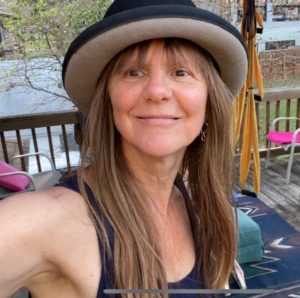
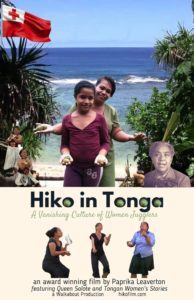
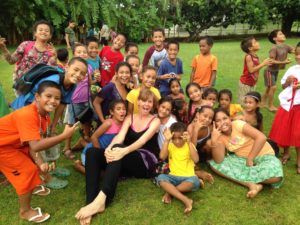
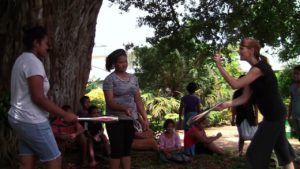
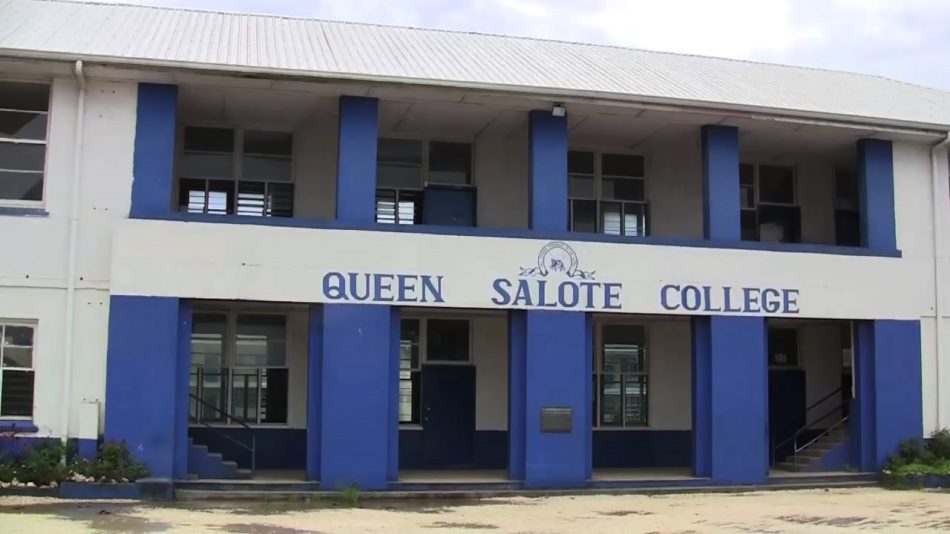
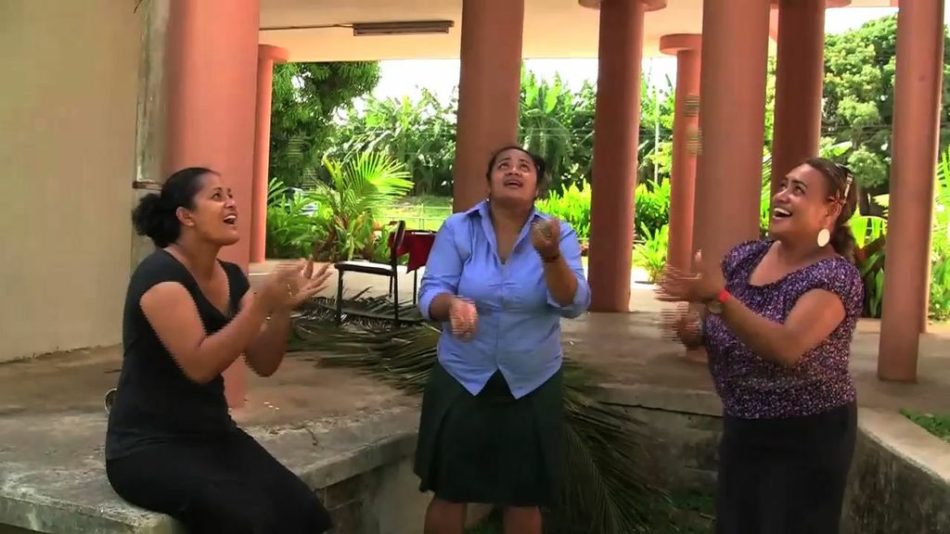
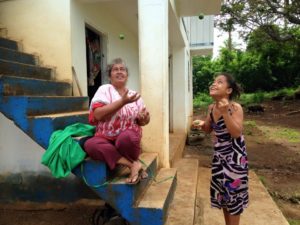
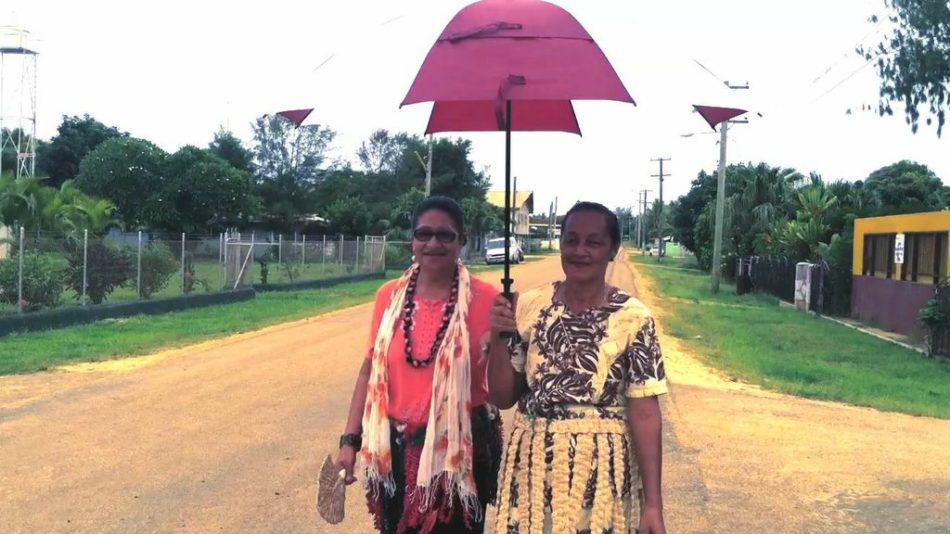

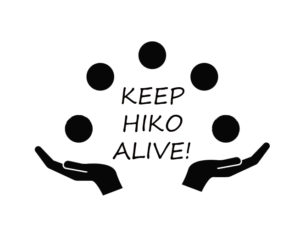






What a unique topic! And Tonga is a country that has long been on my to visit list. Hopefully by 2023.
It has been on my visit list too!
I love these stories of connections and traditions. I had no idea of the juggling culture in Tonga.
Hi Stuart,
Yes its an incredible culture. I was planning on going over there and showing
the film and resurrect the hiko culture with competitions and performances. This
has been delayed by 2 years thus far. These women are amazingly strong and I know that
their skills would transfer into many circus skills. Amazing! Thanks for your comment!
Dave..
Yes Tonga is an amazing unknown culture. They don’t market for tourism
so not many people know about them. But once you are there, they are gracious, kind and
giving. I do hope you make it over! If you do let me know and I’ll give you a bit more guidance. And thanks so much for including my story here! Paprika hikofilm.com
Chin..
I do hope you can visit Tonga sometime soon! And thanks so much for this brilliant forum for sharing travel stories and for writing and organizing this article.
Speaking of travel…I won best Travel Doc in the Golden Gate Int’l Film Fest and now they have chosen my film as the Top 20 of their 6 year fest. It is online now and a fundraiser for the Tongan Tsunami Relief. See the film ‘Hiko in Tonga’ here
www.https://www.neteffectmedia.com/
This is a fantastic documentary. We would love to share this with our Tongan diaspora on Pasifika TV and Radio.
Suli Layt..
Thanks for your reply.
Would love to chat more about sharing the film. It is online now for a few more days. Neteffectmedia.com
Can you email me at hiko.tonga@gmail.com
Thanks so much!
Paprika Leaverton
Director, Producer, Host
It’s a great blessing to have you Paprika document and dedicate so much efforts to “Keeping Hiko Alive” for the Tongan people. As a Tongan native, now liveing in America, I never paid attention to the fact the Hiko was a fading art, especially with our U.S. born children.
The Euless Tongan Committee and Community looks forward to your paticipation at the Euless-Tonga Family Day in October, 2022. We hope to screen your documentary when you visit Euless. Keep Hiko Alive! moe ‘ofa lahi atu.
This a great info – I am surprise juggling is a cultural activities in Tonga. Please keep up the tradition. Great work Paprika Leaverton and Ching Liang, it’s a good read.